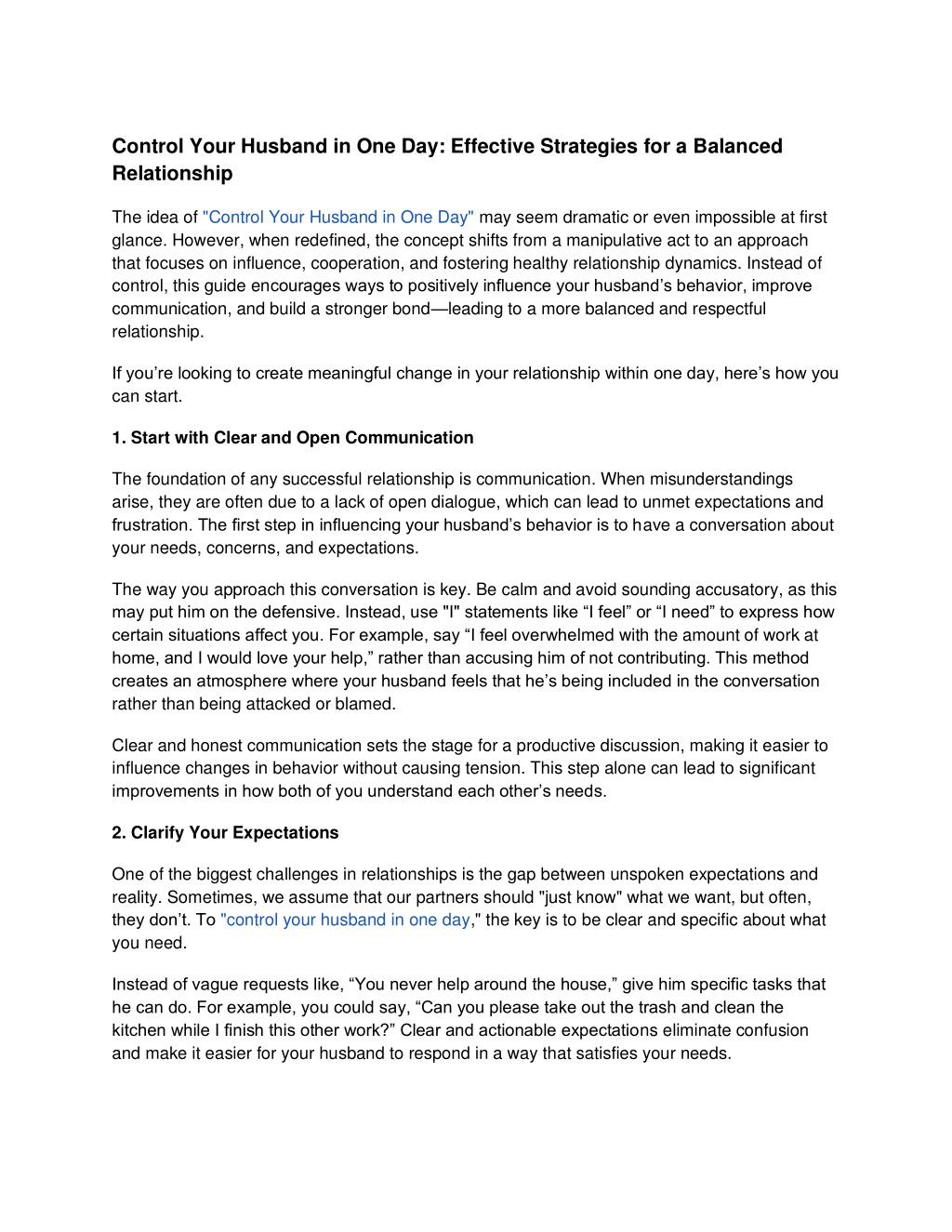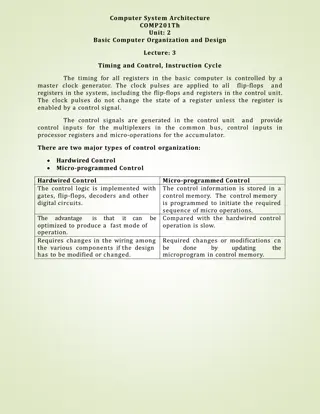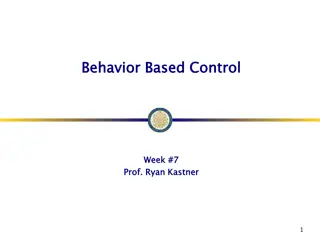
Control Your Husband in one Day
While the idea of controlling your husband in one day may sound ambitious, the real goal should be to influence your relationship positively and cultivate a sense of mutual respect, understanding, and love. By using emotional intelligence, improving
Download Presentation

Please find below an Image/Link to download the presentation.
The content on the website is provided AS IS for your information and personal use only. It may not be sold, licensed, or shared on other websites without obtaining consent from the author. Download presentation by click this link. If you encounter any issues during the download, it is possible that the publisher has removed the file from their server.
E N D
Presentation Transcript
Control Your Husband in One Day: Effective Strategies for a Balanced Relationship The idea of "Control Your Husband in One Day" may seem dramatic or even impossible at first glance. However, when redefined, the concept shifts from a manipulative act to an approach that focuses on influence, cooperation, and fostering healthy relationship dynamics. Instead of control, this guide encourages ways to positively influence your husband s behavior, improve communication, and build a stronger bond leading to a more balanced and respectful relationship. If you re looking to create meaningful change in your relationship within one day, here s how you can start. 1. Start with Clear and Open Communication The foundation of any successful relationship is communication. When misunderstandings arise, they are often due to a lack of open dialogue, which can lead to unmet expectations and frustration. The first step in influencing your husband s behavior is to have a conversation about your needs, concerns, and expectations. The way you approach this conversation is key. Be calm and avoid sounding accusatory, as this may put him on the defensive. Instead, use "I" statements like I feel or I need to express how certain situations affect you. For example, say I feel overwhelmed with the amount of work at home, and I would love your help, rather than accusing him of not contributing. This method creates an atmosphere where your husband feels that he s being included in the conversation rather than being attacked or blamed. Clear and honest communication sets the stage for a productive discussion, making it easier to influence changes in behavior without causing tension. This step alone can lead to significant improvements in how both of you understand each other s needs. 2. Clarify Your Expectations One of the biggest challenges in relationships is the gap between unspoken expectations and reality. Sometimes, we assume that our partners should "just know" what we want, but often, they don t. To "control your husband in one day," the key is to be clear and specific about what you need. Instead of vague requests like, You never help around the house, give him specific tasks that he can do. For example, you could say, Can you please take out the trash and clean the kitchen while I finish this other work? Clear and actionable expectations eliminate confusion and make it easier for your husband to respond in a way that satisfies your needs.
By clearly expressing what you expect from your husband, you remove ambiguity from the situation. This ensures that both of you are on the same page, reducing the likelihood of disappointment and misunderstandings. 3. Use Positive Reinforcement Positive reinforcement is one of the most effective ways to influence your husband s behavior. When he does something that meets your expectations, acknowledge it. Show him that you appreciate his efforts with kind words, compliments, or gestures. For instance, if your husband helps out with household tasks or meets a need you ve expressed, say something like, Thank you so much for taking care of that. It really made my day easier. This kind of positive reinforcement encourages your husband to continue the behavior because he feels appreciated. Psychologically, people are more likely to repeat actions that are rewarded. By offering praise and gratitude, you create an environment where your husband feels motivated to continue making positive contributions to the relationship. 4. Understand and Empathize with His Perspective To positively influence your husband s behavior, you must also show empathy and understanding. Men, just like women, have their own struggles, stresses, and emotional needs. It s important to recognize that your husband may be going through difficulties of his own whether it s work stress, personal challenges, or responsibilities outside the home. Take the time to listen to how he feels. Ask him how his day went and how he s feeling emotionally. Showing genuine care and empathy fosters a deeper emotional connection. When your husband feels understood, he will naturally be more inclined to meet your needs as well. This reciprocity is key to a healthy relationship dynamic. Empathy also helps to create an atmosphere of partnership rather than conflict. Instead of trying to control him, you re working together to find solutions that work for both of you. 5. Set Boundaries with Love and Respect Establishing clear boundaries is important in any relationship, but they must be communicated with love and respect. Boundaries are not about controlling your husband but about defining what is acceptable and what is not, based on your values and needs. For example, if you feel neglected when your husband spends excessive time with his friends or on his hobbies, you can say something like, I enjoy that you have time with your friends, but I d also appreciate it if we could spend more time together during the weekends. This approach allows you to express your needs while respecting his freedom and autonomy.
Healthy boundaries create mutual respect and prevent resentment from building up. When both partners understand each other s limits and preferences, it s easier to create a relationship dynamic that works for both. 6. Leverage Non-Verbal Communication Your body language and tone of voice play an important role in how your husband perceives and responds to you. If you want to influence your husband in a positive way, be mindful of your non-verbal communication. A calm tone, a gentle touch, or a warm smile can make a significant difference in how he receives your requests or concerns. In moments of tension, try to maintain open and positive body language. Crossing your arms, raising your voice, or using a harsh tone can escalate conflict. Instead, a gentle hand on his arm or maintaining eye contact when talking can help create a more intimate and understanding environment, encouraging cooperation. Positive non-verbal cues help reinforce the message that you re working as a team rather than engaging in a power struggle. 7. Encourage a Partnership Mindset Marriage and relationships thrive when both partners see themselves as equals working toward common goals. Rather than thinking of controlling your husband, shift the focus to encouraging teamwork and collaboration. This mindset helps both of you feel invested in the relationship. Approach problems or conflicts with an attitude of partnership. For example, if you re feeling overwhelmed by household chores, frame the conversation around teamwork: Let s figure out how we can divide these tasks so we both have more time to relax. This shifts the conversation from being about control to being about mutual support and cooperation. By fostering a partnership mentality, you create an environment where both of you feel responsible for the well-being of the relationship. This encourages your husband to take initiative and share in the responsibilities. 8. Show Patience and Flexibility While the goal might be to influence your husband s behavior in one day, it s important to remain patient and flexible. Behavior change doesn t always happen immediately, and both partners need time to adjust to new dynamics. Be patient if your husband doesn t meet all your expectations right away. The goal is progress, not perfection. Flexibility allows both of you to make gradual changes while still maintaining a sense of balance in the relationship. When your husband sees that you are willing to be patient and understanding, he ll be more motivated to meet your needs over time.
Conclusion: Control Your Husband in One Day with Positive Influence The idea of "Controlling Your Husband in One Day" is less about manipulation and more about influencing positive behavior in your relationship. Through clear communication, empathy, positive reinforcement, and mutual respect, you can guide your husband s actions in a way that benefits both of you. Instead of viewing control as domination, focus on fostering a partnership where both of you contribute to the well-being of the relationship. A healthy relationship is built on teamwork, understanding, and love. By following these strategies, you can improve the dynamics in your relationship and create a more balanced, harmonious connection that lasts far beyond just one day.



![Property Settlements in Family Law: Case Study of Stamatou & Stamatou [2022] FedCFamC1F 241](/thumb/63303/property-settlements-in-family-law-case-study-of-stamatou-stamatou-2022-fedcfamc1f-241.jpg)












































